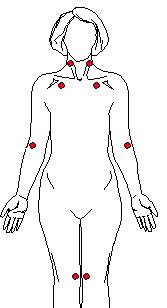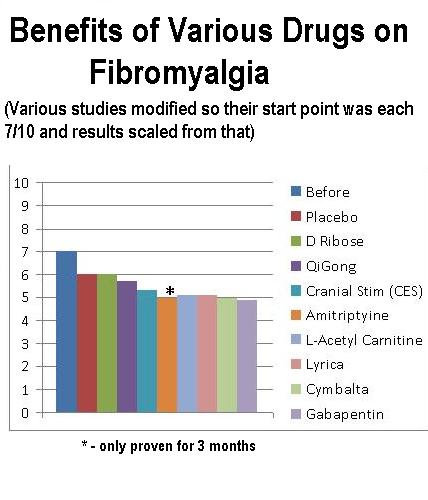In order to get significant improvement in quality of life, 30% and preferably 50% improvement of pain needs to be reached. Unless you are a responder, no one medication is guaranteed to do that

Pain. 2010 Mar 25. [Epub ahead of print]
Fibromyalgia: Moderate and substantial pain intensity reduction predicts improvement in other outcomes and substantial quality of life gain.
Moore RA, Straube S, Paine J, Phillips CJ, Derry S, McQuay HJ.
30% = moderate pain better; 50% = substantial better
Various studies of medications are difficult to interpret:
- They like to present results in relative term – how much difference rather that absolute levels
- Their initial pain ratings are different.
- The include results for their best and the non-responders separately – I put the results altogether
I have tried to put them all initially at 7/10 so you could see absolutely what difference in benefits. Putting responders and non-responders all together and looking for the averaged improvements, I came out with a shocking result – they all do about the same – a drop of 2/10:

None of these are guarenteed to give you the 2.3/10 drop needed for 30% better or the 3.5/10 drop needed for substantially better.
So who gets better? One who uses multiple measures to obtain results –
- Exercise – especially in the water – we have water moves at south east leisure center and the arthritis society has one at Wascana (the warmest)
- CAM’s – We all have mechanical joint and muscles issues. In FM they will all hurt. Manipulation, massage, acupuncture and so on will all give temporary relief
- Relaxation – Other people can be tense and get away with it. You try and boy you’re in trouble – you have to live a very cool existence-
- Yoga – check class listings
- Tai Chi (I go to Toaist Tai Chi on Pasqua St. near Hill Ave.)
- Hypnosis
- Biofeedback (you can get old radio shack ones off ebay)
- Meditation – I am lucky enough to have Roger Bartholomew, a longstanding Tibetan Buddhist, volunteer to train victims and even have a group meditation for them. Thank you Roger.
- Pacing
- I see people wanting to try one measure at a time to see which works – that never works. The only time I have seen people get better is when they are doing so many things at once, they can’t tell which one is doing it.
- depression – In FM this is very bad and can lead to temporary brain damage. You need to have a doctor treat that despite the fact you will “hear” any side effects at full volume because chronic pain blows any mufflers you have to that sort of thing. For those that can’t tolerate anything, I have tried DHEA 100 mg three times daily – you can order off Ebay but is better when doctor orders it…)
- Sleep -R/o sleep apnea variants (disordered sleep being one) You should have that tested though could take years in this city. Two Oxygen suppliers in Regina will do testing – Vitalaire will do basic finger testing oxymetry overnight. Prairie Oxygen has a more sophisticated testing. Certain drug plans will cover it for sleep apnea testing.
- Coping – in Saskatoon, there is a 3-6 week program for people with chronic pain that includes that. For people over 65, there is a program run by the Psychology dept at University of Regina.
- There is a Fibromyalgia support group in Regina see here
I wish they would hurry up and decide whether there really is an infection involved…
Any comments or suggestions? zapatillas air max zapatillas air max
